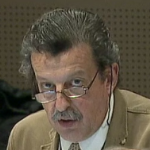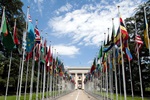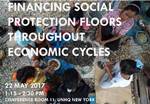Published on Fri, 2017-05-26 15:23
Social security is a human right and in time of crisis is even more important, not just to face the crisis and the impact on people but also to estabilize the economy said Roberto Bissio, Coordinator of Social Watch, who was a speaker on behalf of the Global Coalition for Social Protection Floors (GCSPF) at the side event "Financing Social Protection Floors throught economic cycles". |
Published on Fri, 2017-05-26 15:06
Why is it so difficult to achieve meaningful coordination when everybody agrees that it is desirable, if not necessary? President Richard Nixon's withdrawal of the US from and hence termination of the Bretton Woods system in 1971 confirmed the end of the post-war Golden Age. This led to slower growth, greater volatility, more instability, and reduced progress in raising economic welfare, among other consequences. |
Published on Fri, 2017-05-26 13:52
The question pertaining to the impact of States’ participation in designing an Instrument on transnational corporations and other business enterprises in the area of human rights (hereafter referred to as ‘the Instrument’) on attracting foreign direct investment has been a persistent issue of discussion since the mandate of the intergovernmental group on the Instrument was established. This mandate was established by Resolution A/ HRC/26/9 of the United Nations Human Rights Council, which was passed in July 2014. It is important to contextualize this question within an understanding of the role of investment policy as one of the development and economic policy tools available to States, including the role of both domestic and foreign investments, and within an understanding of the underlying determinants of foreign direct investment. This discussion could be informed by the experience of countries reforming their positions towards investment treaties, which entail a regulatory change pertaining to foreign investors. |
Published on Fri, 2017-05-19 14:00
A new report examines the role that multi-stakeholder partnerships play in the implementation of the SDGs. The report warns of the risks, side-effects and dangers, as well as the opportunities, of such partnerships. The contributions deal with some of the major global partnerships in the area of food security, renewable energy and data availability. |
Published on Wed, 2017-05-17 12:03
Social protection is crucial to build resilience and empower people in tough economic times. It can also spur inclusive growth and productivity in good times if adequate public financing is provided throughout the economic cycle. This event will discuss concrete experiences and options to finance fiscally sustainable social protection systems, including floors, in prosperous and adverse economic times. |
SUSCRIBE TO OUR NEWSLETTER







